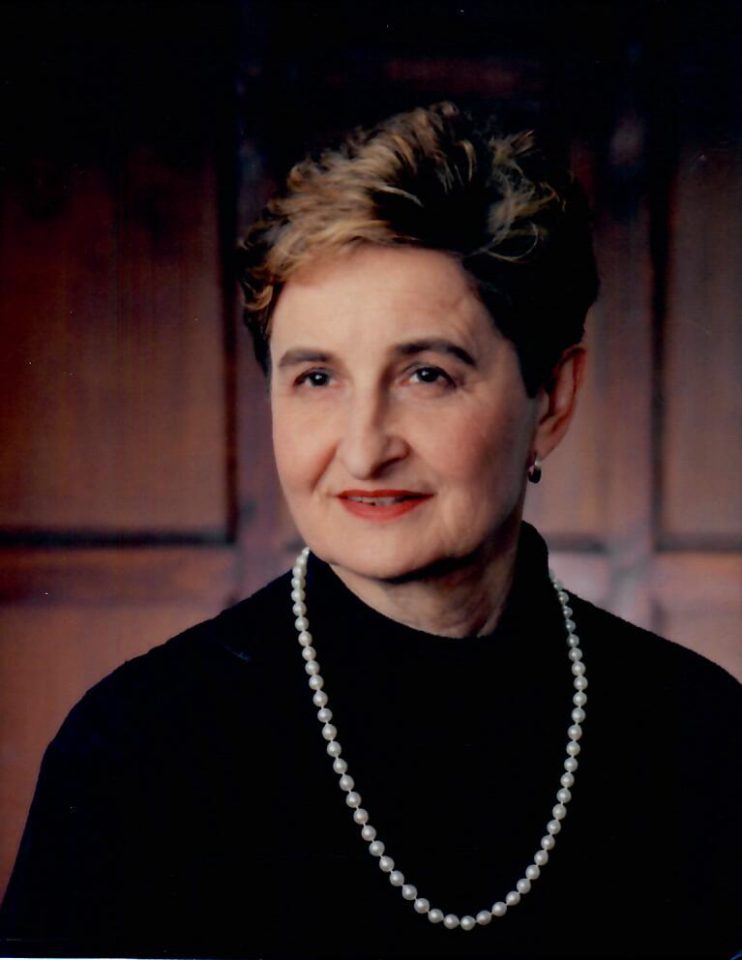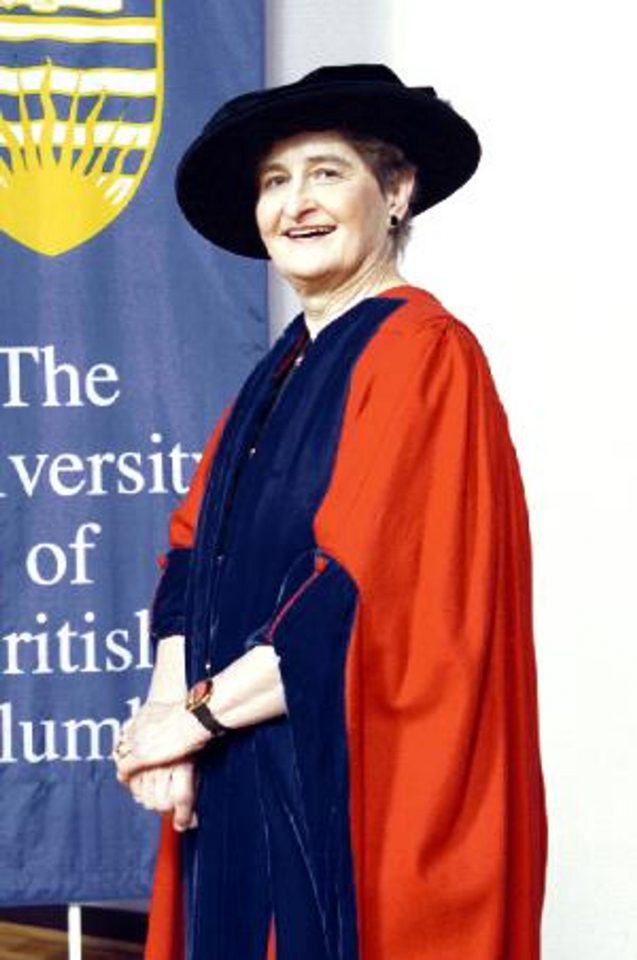
Alice J. Baumgart graduated as a registered nurse from the Vancouver General Hospital School of Nursing in 1957 and with a baccalaureate degree in nursing from the University of British Columbia School of Nursing in 1958. The curriculum at that time was affectionately known as the “sandwich program;” the five-year program began with one year at university, three in the hospital, and then a culminating year for those who chose to complete the degree back at the university. From 1959 to 1962, Alice taught at the UBC School of Nursing before heading off to McGill University to obtain her master’s degree in 1964. She returned to UBC School of Nursing as a faculty member from 1964 to 1973 before departing to obtain a doctorate in behavioral science at the University of Toronto.
Following her doctoral studies, Dr. Baumgart was appointed to a faculty position in the School of Nursing at Queen’s University, ultimately rising to the position of Dean of Nursing, a role she played for two terms (1977-1988, and 1994-1997). Between those terms, from 1988 to 1993, she served as Vice-Principal (Human Services). This constituted an historic appointment, representing the first woman appointed to the position of Vice-Principal in the history of Queen’s, and the first Canadian nurse appointed to an academic leadership position at that level.
Throughout her years in academic leadership at Queen’s, Dr. Baumgart also stepped up in leadership to the profession in numerous prominent roles. On the international front, she was highly prominent as an elected member-at-large for the International Council of Nurses, the organization that represents all national nursing professional associations globally. Building on the success of the Alma-Ata Conference in 1978, in 1981 Dr. Baumgart addressed the nurses of the world with a Plenary Paper presented at the Seventeenth Ouadrennial Congress of the International Council of Nurses in Los Angeles. The substance of her speech on that occasion was published the following year in an article entitled “Nursing for a new century: A future framework” [Journal of Advanced Nursing, 7, 19-23]. The following segment of the challenge she was advancing to the nurses of the world 40 years ago clearly illustrates her visionary advocacy, with a message that would be as appropriate today as it was then:

I started with the premise that a new order cannot be maintained in a mood of pessimism and defensiveness.
Thus, I see the first item on the agenda as being how to direct attention to the many hopeful developments in nursing rather than dwelling on the recurrent problems.
Closely related to this is how to harness the new consciousness of nurses about their own realities, both historical and contemporary, to the goal of health for all (including the health of nurses themselves).
Thirdly, I see the need to re-examine the mission and modes of operation of professional associations to assure that they play an effective political and choreographic role in fostering international cooperation to expand the opportunities for nurses to deliver primary care.
In putting forth these three agenda items I have not explicitly mentioned the moral responsibility of the nursing profession. That is because I simply believe that in an audience of nurses, it is generally accepted that a moral responsibility does rest with us to mobilize nursing resources for human benefit on a global basis. (Baumgart, 1982, p. 23).
Dr. Baumgart brought that same passionate commitment to her leadership in nursing nationally.
In particular, she served as President (1990-1992) of the Canadian Association of Nurses, the national professional association representing all nurses in Canada. She also later served as President of the Canadian Association of University Schools of Nursing, an organization comprised of all of Canada’s degree-granting nursing programs that was the precursor to the current Canadian Association of Schools of Nursing. She also promoted leadership training in nursing across the country with her many publications, not the least of which was her highly influential and widely-used text – Baumgart, A. (1988). Canadian Nursing Faces the Future: Development and Change. Toronto: Mosby [and a second edition in 1992 with J. Larsen]. This was widely recognized as the definitive history of nursing leadership in Canada, and ensured that a generation of nurses fully understood and integrated an understanding of the importance of the most central policy documents influencing the health care system and our profession, including The Weir Report (by G.M. Weir, 1932), The Hall Commission Reports (Justice E.M. Hall, 1964), and The Lalonde Report (Government of Canada, 1974).
In addition to her formal roles, Dr. Baumgart maintained active professional networks with nursing policy leaders and their allies around the world. For example, she played a major role in supporting her colleague and friend Dr. Verna Huffman Splane who, with her husband Dr. Richard Splane, undertook a project to interview chief nursing officers and government leaders in a 50-country study of the role of the senior nursing position in national ministries of health. Their book, Chief Nursing Officer Positions in National Ministries of Health: Focal Points for Nursing Leadership, became a landmark study which generated international interest and continues to be a resource today as Canada once again has appointed a Chief Nursing Officer federally. Throughout that project and many more, Dr. Baumgart remained an enthusiastic champion, critic, collaborator and colleague, encouraging others to step up in meaningful ways to ensure that health and social policy was made with the benefit of nursing wisdom. She engaged in this manner with an extensive network of international health and nursing dignitaries, and continued to collaborate with junior colleagues offering advice and guidance as well as encouragement to step forward in leadership.

Dr. Alice Baumgart has been an exemplary academic and professional nursing leader all of her life. During her time on the faculty at Queen’s School of Nursing, she elevated that School to national prominence as a site of policy advocacy, professional community activity, and the scholarship of leadership. And since that time, Dr. Baumgart has remained among the most respected and highly revered voices in Canadian nursing, never forgetting her UBC roots and remaining in close collaborative contact with her UBC colleagues. Her graduating class, the Class of ’58, has remained one of the most active classes in terms of remaining connected and having reunions. In 2008, 24 of the 28 surviving members met for their 50th anniversary gathering, establishing at that time the Graduating Class of 1958 Emergency Fund to support UBC nursing students in times of financial need.
Dr. Baumgart’s outstanding contributions to the profession nationally and internationally have been recognized in numerous awards and honours. She was also recognized by UBC in conferring her with the doctor of laws honoris causa in 2000 and in 2019 received School of Nursing Centenary Medal of Distinction. Some records related to her career accomplishments are available in the archives of the BC History of Nursing Society.
See more at the BC History of Nursing Society archives
http://bcnursinghistory.ca/archives/biographical-files